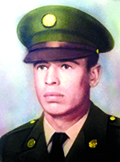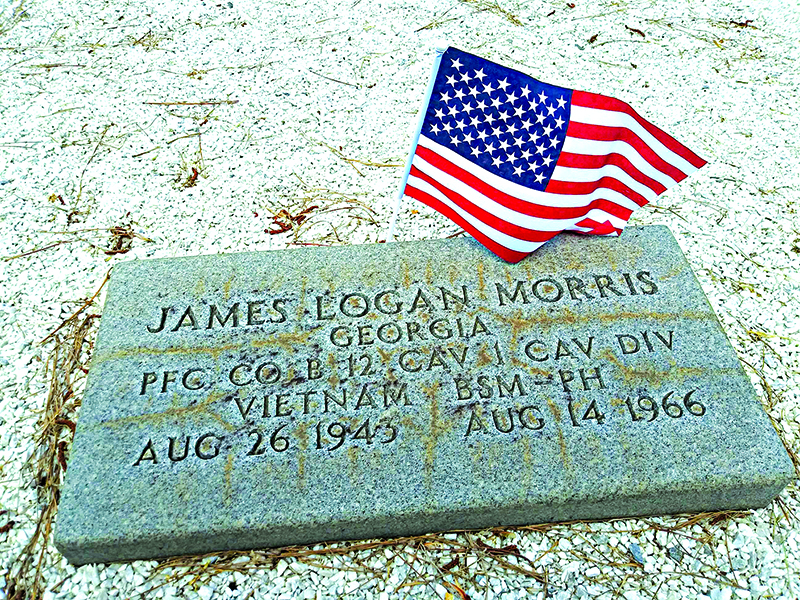‘He lived with a purpose’

When James Morris had orders cut for Vietnam in 1966, he was to ship out from Fort Dix, New Jersey. He didn’t fly there from Georgia, nor did he take a bus or train. His parents drove him up the East Coast to the Army depot.
“Later, his mother told us many times they had to do this because she felt it would be the last time she would see him,” said Morris’ sister-in-law, Barbara Higgins Morris.
She was right.
Army Private First Class James Logan Morris was killed 12 days before his 23rd birthday on Aug. 14, 1966, according to the National Archives (archives.gov/aad). His parents were Harley A. Morris and Bertha L. Reed Morris, both from Ellijay.
His sister, Louise Morris, was on that trip to New Jersey.
“My brother James was the best, just wonderful. He was mild-mannered, polite, kind and smart — and the go-to person if I had a serious question. If I needed to know about Santa Claus or anything, I checked it out with James first,” she said with a laugh. “He always had an answer for the little sister to my questions, and a very kind answer too.”
Louise remembered that when she fell, James “picked me up and brushed me off. They are good memories. Both brothers (including Charles) were protective of me.”
She remembers how intelligent James was and asked him, “‘You never do homework, but you make straight As. How do you do that?’ And he said, ‘I do homework,’ and I said, ‘No, I’ve watched you, you don’t.’ And he said, ‘Well, we have this thing called study hall, and I do anything I need to do in study hall.’
“What impresses me about that — I was at Ellijay Elementary and didn’t know what study hall was — was later, when I learned about the 30 minutes in study hall, and I wondered how he made that happen.”
Barbara, who graduated Gilmer High School in 1961 with James, also noted he was “a very good student — straight As and A-pluses.”
“He never had to study,” she agreed. “He was kind of quiet in high school.”
Gyann Holt, a student at GHS in the Class of 1961, said she only knew James “from a class perspective.”
“He was very intent and serious in his scholarly studies,” she said. “He was always rushing through the halls to get to the next class. He was very friendly with people.”
A memorable football play
Holt’s husband, Ben, was at Gilmer High with James.
“He was a junior when I was a senior, I graduated a year ahead of him,” he said. “You could label him as a good kid. He was quiet and shy and real polite — wasn’t loud and boisterous like most kids our age were at that time. I had a few classes with him, and remember he was in advanced math class. I liked to sit at the same table with him (in class), because he could come up with some answers. I’m almost certain he was an honor graduate.”
A year after he graduated, Ben saw one of the most memorable plays in Bobcat football history.
“He was just a good kid, and a good ballplayer,” he said. “I can remember his senior year, it was on the old (high school) football field at Ellijay Elementary School. He was a receiver, and I remember this play like it was yesterday. James was going deep — and I think Johnny Holmes was the quarterback — and Johnny threw him a deep pass. Somebody tried to block James or something, and he fell down. He was laying on his back and caught the ball for a touchdown.”
Barbara said James worked with his father in logging and timber after high school.
“He knew pretty much that he was going to be drafted, and we all tried to talk him into enlisting, because my husband was in the Air Force at that point,” she remembered. “But he said no, he wanted to do his two years and then come back and decide what he wanted to do.
“He was killed after being there a couple of months; he was not there long. We were all devastated.”
Ben learned from a man who was in his unit James had been engaged in “a dangerous firefight” that day.
“This man was close by and saw James killed when a mortar shell hit him. That man was later killed in Vietnam. It was a sad day when I heard about it, I can tell you that. Anybody that knew him was affected — everybody thought the world of him,” Ben said, becoming emotional. “It’s sad for me right now just to think about it.”
Louise had graduated GHS in 1965 and was at Emory University when she learned her brother had been killed.
“Everyone responded, people I didn’t know — they were there, the whole community. It was really very difficult,” she remembered of those days and the funeral at Liberty Baptist Church.
Gyann noted James “lived with a purpose.”
“It was too bad his life was cut short,” she said. “Because he would have really done wonders. I would have looked at him as the type person who would have had some sort of career. In our graduating class, there weren’t that many people who finished college … he would have been one of them.
“I feel like this boy had it all together. It’s like this world lost, and probably suffered in some way, from the loss of him.”
Ben added of Memorial Day, and especially Vietnam veterans, “It’s a great tribute for everybody (that was killed). It sure is. They deserved more than they received.”
Morris was awarded a Bronze Star with ‘V’ designation, the Purple Heart and a Gallantry Cross with Palm (awarded by the Republic of Vietnam), according to the family.

